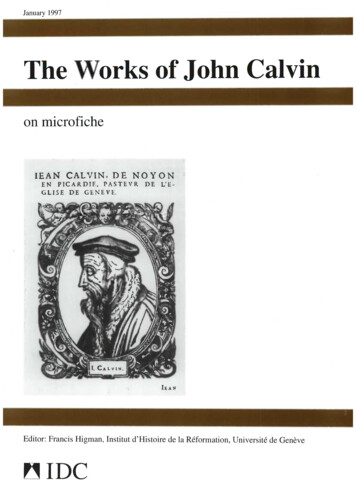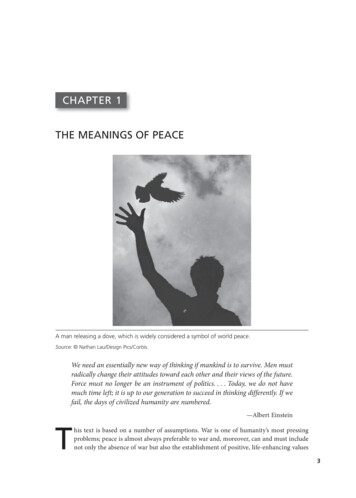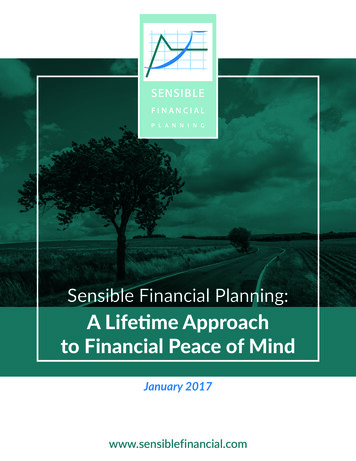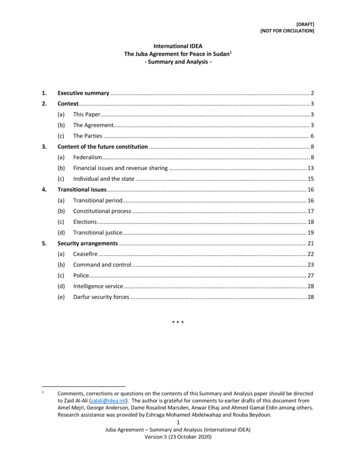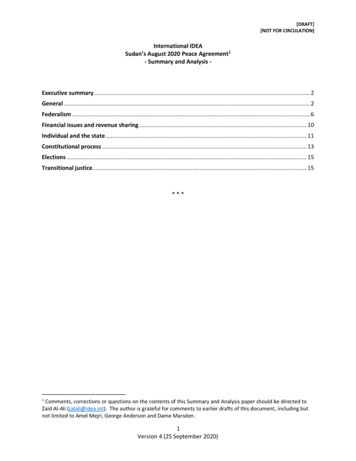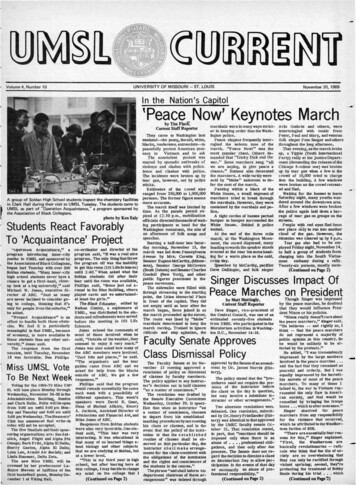
Transcription
A Separate Peace by John KnowlesChapter 1I went back to the Devon School not long ago, and found it looking oddly newer than when I wasa student there fifteen years before. It seemed more sedate than I remembered it, moreperpendicular and strait-laced, with narrower windows and shinier woodwork, as though a coatof varnish had been put over everything for better preservation. But, of course, fifteen yearsbefore there had been a war going on. Perhaps the school wasn’t as well kept up in those days;perhaps varnish, along with everything else, had gone to war.I didn’t entirely like this glossy new surface, because it made the school look like a museum, andthat’s exactly what it was to me, and what I did not want it to be. In the deep, tacit way in whichfeeling becomes stronger than thought, I had always felt that the Devon School came intoexistence the day I entered it, was vibrantly real while I was a student there, and then blinked outlike a candle the day I left.Now here it was after all, preserved by some considerate hand with varnish and wax. Preservedalong with it, like stale air in an unopened room, was the well known fear which had surroundedand filled those days, so much of it that I hadn’t even known it was there. Because, unfamiliarwith the absence of fear and what that was like, I had not been able to identify its presence.Looking back now across fifteen years, I could see with great clarity the fear I had lived in,which must mean that in the interval I had succeeded in a very important undertaking: I musthave made my escape from it.I felt fear’s echo, and along with that I felt the unhinged, uncontrollable joy which had been itsaccompaniment and opposite face, joy which had broken out sometimes in those days likeNorthern Lights across black sky.There were a couple of places now which I wanted to see. Both were fearful sites, and that waswhy I wanted to see them. So after lunch at the Devon Inn I walked back toward the school. Itwas a raw, nondescript time of year, toward the end of November, the kind of wet, self-pityingNovember day when every speck of dirt stands out clearly. Devon luckily had very little of suchweather—the icy clamp of winter, or the radiant New Hampshire summers, were morecharacteristic of it—but this day it blew wet, moody gusts all around me.I walked along Gilman Street, the best street in town. The houses were as handsome and asunusual as I remembered. Clever modernizations of old Colonial manses, extensions in Victorianwood, capacious Greek Revival temples lined the street, as impressive and just as forbidding asever. I had rarely seen anyone go into one of them, or anyone playing on a lawn, or even an openwindow. Today with their failing ivy and stripped, moaning trees the houses looked both moreelegant and more lifeless than ever.1
Like all old, good schools, Devon did not stand isolated behind walls and gates but emergednaturally from the town which had produced it. So there was no sudden moment of encounter asI approached it; the houses along Gilman Street began to look more defensive, which meant thatI was near the school, and then more exhausted, which meant that I was in it.It was early afternoon and the grounds and buildings were deserted, since everyone was at sports.There was nothing to distract me as I made my way across a wide yard, called the Far Commons,and up to a building as red brick and balanced as the other major buildings, but with a largecupola and a bell and a clock and Latin over the doorway—the First Academy Building.In through swinging doors I reached a marble foyer, and stopped at the foot of a long whitemarble flight of stairs. Although they were old stairs, the worn moons in the middle of each stepwere not very deep. The marble must be unusually hard. That seemed very likely, only too likely,although with all my thought about these stairs this exceptional hardness had not occurred to me.It was surprising that I had overlooked that, that crucial fact.There was nothing else to notice; they of course were the same stairs I had walked up and downat least once every day of my Devon life. They were the same as ever. And I? Well, I naturallyfelt older—I began at that point the emotional examination to note how far my convalescencehad gone—I was taller, bigger generally in relation to these stairs. I had more money and successand “security” than in the days when specters seemed to go up and down them with me.I turned away and went back outside. The Far Common was still empty, and I walked alonedown the wide gravel paths among those most Republican, bankerish of trees, New Englandelms, toward the far side of the school.Devon is sometimes considered the most beautiful school in New England, and even on thisdismal afternoon its power was asserted. It is the beauty of small areas of order—a large yard, agroup of trees, three similar dormitories, a circle of old houses—living together in contentiousharmony. You felt that an argument might begin again any time; in fact it had: out of the Dean’sResidence, a pure and authentic Colonial house, there now sprouted an ell with a big bare picturewindow. Some day the Dean would probably live entirely encased in a house of glass and behappy as a sandpiper. Everything at Devon slowly changed and slowly harmonized with whathad gone before. So it was logical to hope that since the buildings and the Deans and thecurriculum could achieve this, I could achieve, perhaps unknowingly already had achieved, thisgrowth and harmony myself.I would know more about that when I had seen the second place I had come to see. So I roamedon past the balanced red brick dormitories with webs of leafless ivy clinging to them, through aramshackle salient of the town which invaded the school for a hundred yards, past the solidgymnasium, full of students at this hour but silent as a monument on the outside, past the FieldHouse, called The Cage—I remembered now what a mystery references to “The Cage” had beenduring my first weeks at Devon, I had thought it must be a place of severe punishment—and Ireached the huge open sweep of ground known as the Playing Fields.2
Devon was both scholarly and very athletic, so the playing fields were vast and, except at such atime of year, constantly in use. Now they reached soggily and emptily away from me, forlorntennis courts on the left, enormous football and soccer and lacrosse fields in the center, woods onthe right, and at the far end a small river detectable from this distance by the few bare trees alongits banks. It was such a gray and misty day that I could not see the other side of the river, wherethere was a small stadium.I started the long trudge across the fields and had gone some distance before I paid any attentionto the soft and muddy ground, which was dooming my city shoes. I didn’t stop. Near the centerof the fields there were thin lakes of muddy water which I had to make my way around, myunrecognizable shoes making obscene noises as I lifted them out of the mire. With nothing toblock it the wind flung wet gusts at me; at any other time I would have felt like a fool sloggingthrough mud and rain, only to look at a tree.A little fog hung over the river so that as I neared it I felt myself becoming isolated fromeverything except the river and the few trees beside it. The wind was blowing more steadily here,and I was beginning to feel cold. I never wore a hat, and had forgotten gloves. There wereseveral trees bleakly reaching into the fog. Any one of them might have been the one I waslooking for. Unbelievable that there were other trees which looked like it here. It had loomed inmy memory as a huge lone spike dominating the riverbank, forbidding as an artillery piece, highas the beanstalk. Yet here was a scattered grove of trees, none of them of any particular grandeur.Moving through the soaked, coarse grass I began to examine each one closely, and finallyidentified the tree I was looking for by means of certain small scars rising along its trunk, and bya limb extending over the river, and another thinner limb growing near it. This was the tree, andit seemed to me standing there to resemble those men, the giants of your childhood, whom youencounter years later and find that they are not merely smaller in relation to your growth, but thatthey are absolutely smaller, shrunken by age. In this double demotion the old giants have becomepigmies while you were looking the other way.The tree was not only stripped by the cold season, it seemed weary from age, enfeebled, dry. Iwas thankful, very thankful that I had seen it. So the more things remain the same, the more theychange after all—plus c'est la même chose, plus ça change. Nothing endures, not a tree, not love,not even a death by violence.Changed, I headed back through the mud. I was drenched; anybody could see it was time tocome in out of the rain.The tree was tremendous, an irate, steely black steeple beside the river. I was damned if I’dclimb it. The hell with it. No one but Phineas could think up such a crazy idea.He of course saw nothing the slightest bit intimidating about it. He wouldn’t, or wouldn’t admitit if he did. Not Phineas.“What I like best about this tree,” he said in that voice of his, the equivalent in sound of ahypnotist’s eyes, “what I like is that it’s such a cinch!” He opened his green eyes wider and gave3
us his maniac look, and only the smirk on his wide mouth with its droll, slightly protruding upperlip reassured us that he wasn’t completely goofy.“Is that what you like best?” I said sarcastically. I said a lot of things sarcastically that summer;that was my sarcastic summer, 1942.“Aey-uh,” he said. This weird New England affirmative—maybe it is spelled “aie-huh”—alwaysmade me laugh, as Finny knew, so I had to laugh, which made me feel less sarcastic and lessscared.There were three others with us—Phineas in those days almost always moved in groups the sizeof a hockey team—and they stood with me looking with masked apprehension from him to thetree. Its soaring black trunk was set with rough wooden pegs leading up to a substantial limbwhich extended farther toward the water. Standing on this limb, you could by a prodigious effortjump far enough out into the river for safety. So we had heard. At least the seventeen-year-oldbunch could do it; but they had a crucial year’s advantage over us. No Upper Middler, which wasthe name for our class in the Devon School, had ever tried. Naturally Finny was going to be thefirst to try, and just as naturally he was going to inveigle others, us, into trying it with him.We were not even Upper Middler exactly. For this was the Summer Session, just established tokeep up with the pace of the war. We were in shaky transit that summer from the groveling statusof Lower Middlers to the near-respectability of Upper Middlers. The class above, seniors, draftbait, practically soldiers, rushed ahead of us toward the war. They were caught up in acceleratedcourses and first-aid programs and a physical hardening regimen, which included jumping fromthis tree. We were still calmly, numbly reading Virgil and playing tag in the river fartherdownstream. Until Finny thought of the tree.We stood looking up at it, four looks of consternation, one of excitement. “Do you want to gofirst?” Finny asked us, rhetorically. We just looked quietly back at him, and so he began takingoff his clothes, stripping down to his underpants. For such an extraordinary athlete—even as aLower Middler Phineas had been the best athlete in the school—he was not spectacularly built.He was my height—five feet eight and a half inches (I had been claiming five feet nine inchesbefore he became my roommate, but he had said in public with that simple, shocking selfacceptance of his, “No, you’re the same height I am, five-eight and a half. We’re on the shortside”). He weighed a hundred and fifty pounds, a galling ten pounds more than I did, whichflowed from his legs to torso around shoulders to arms and full strong neck in an uninterrupted,unemphatic unity of strength.He began scrambling up the wooden pegs nailed to the side of the tree, his back muscles workinglike a panther’s. The pegs didn’t seem strong enough to hold his weight. At last he stepped ontothe branch which reached a little farther toward the water. “Is this the one they jump from?”None of us knew. “If I do it, you’re all going to do it, aren’t you?” We didn’t say anything veryclearly. “Well,” he cried out, “here’s my contribution to the war effort!” and he sprang out, fellthrough the tops of some lower branches, and smashed into the water.4
“Great!” he said, bobbing instantly to the surface again, his wet hair plastered in droll bangs onhis forehead. “That’s the most fun I’ve had this week. Who’s next?”I was. This tree flooded me with a sensation of alarm all the way to my tingling fingers. My headbegan to feel unnaturally light, and the vague rustling sounds from the nearby woods came to meas though muffled and filtered. I must have been entering a mild state of shock. Insulated by this,I took off my clothes and started to climb the pegs. I don’t remember saying anything. Thebranch he had jumped from was slenderer than it looked from the ground and much higher. Itwas impossible to walk out on it far enough to be well over the river. I would have to spring farout or risk falling into the shallow water next to the bank. “Come on,” drawled Finny frombelow, “stop standing there showing off.” I recognized with automatic tenseness that the viewwas very impressive from here. “When they torpedo the troopship,” he shouted, “you can’t standaround admiring the view. Jump!”What was I doing up here anyway? Why did I let Finny talk me into stupid things like this? Washe getting some kind of hold over me?“Jump!”With the sensation that I was throwing my life away, I jumped into space. Some tips of branchessnapped past me and then I crashed into the water. My legs hit the soft mud of the bottom, andimmedia
A Separate Peace by John Knowles Chapter 1 I went back to the Devon School not long ago, and found it looking oddly newer than when I was a student there fifteen


